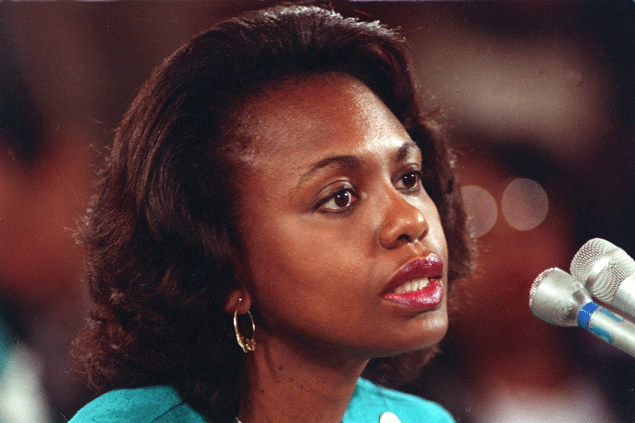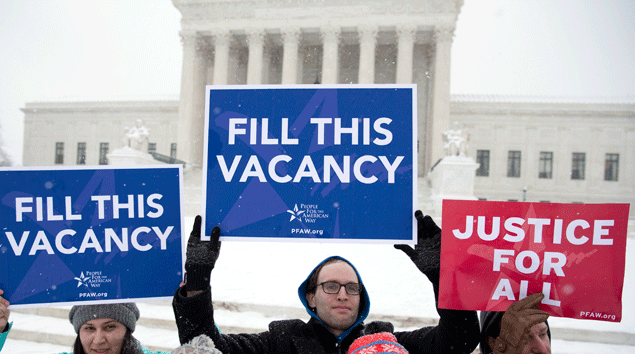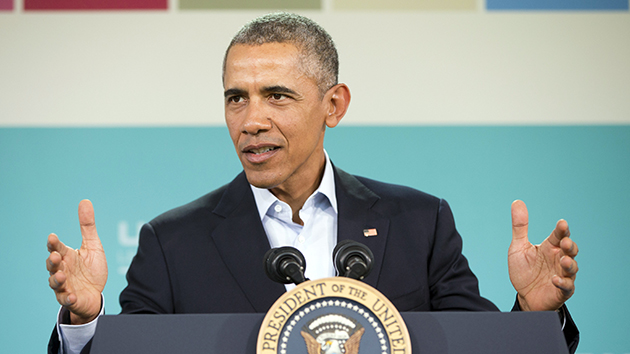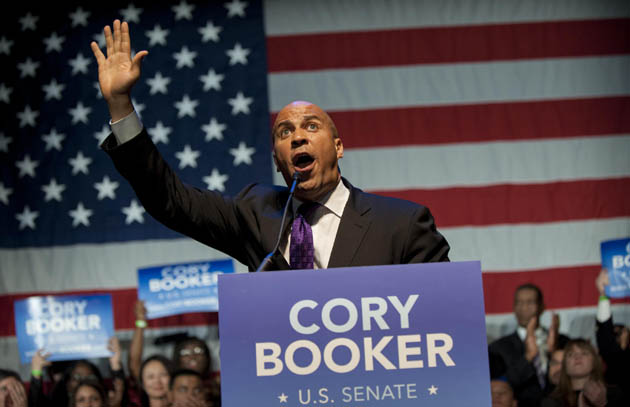
Anita Hill, testifying before the Senate Judiciary Committee in the 1991 confirmation hearing for Supreme Court Justice Clarence ThomasJohn Duricka/AP
In the few days since Supreme Court Justice Antonin Scalia unexpectedly died, the media has been awash in speculation about whom President Barack Obama will choose to replace him. Most of the guessing isn’t based on anything the White House has done or said. One administration insider says the White House hasn’t even started leaking names as trial balloons. Still, as always happens, names start to emerge within media and political circles, and some floating about now are wildly unrealistic.
Here are some of the more fanciful ideas that, rest assured, Obama will not be adopting:
Anita Hill: Currently the focus of a Change.org petition demanding her nomination, Hill is famous for her role in the contentious 1991 nomination hearings for Supreme Court Justice Clarence Thomas. She accused Thomas of sexually harassing her when they worked together at the Equal Employment Opportunity Commission. A Yale law graduate, like Thomas, Hill is now a law professor at Brandeis University—credentials that supporters say make her well qualified for the Supreme Court. As the late New York Times reporter David Carr used to observe, journalists have to “root for the story,” and a Hill nomination would be some story. It would, no doubt, cause a complete meltdown on the right. But this is more of a West Wing scenario than an Obama White House possibility.
Sen. Cory Booker: Booker, a Democrat from New Jersey, sometimes seems to have superhero powers. As mayor of Newark, he rescued a woman from a burning building, saved a freezing dog, and shoveled the walk of an elderly constituent. But despite what the New York Times says, he’s not going to be a Supreme Court justice. Booker is indeed a lawyer, with a Yale law degree, but he would present the president with significant concerns about his lack of judicial experience. And there may be questions about his judicial temperament. Booker is far too outspoken in public for a Supreme Court justice. (On the court, pithy one-liners are generally confined to the written opinion or oral arguments.) Booker has threatened to ban Conan O’Brien from the Newark airport, dissed Obama during his presidential campaign, and spent too much time on Twitter promoting veganism. Just his extensive political record as mayor of a New Jersey city known for corruption and his partnership with Facebook founder Mark Zuckerberg would provide so much fodder for GOP senators that he would ensure the country’s longest confirmation hearings ever.
Sen. Elizabeth Warren: A darling of the progressive movement, former Harvard Law professor Warren gets her name floated for lots of jobs. So why not the Supreme Court? A Warren nomination is severely hampered by one big thing: her age. It’s not sexism, or even ageism, at work here. It’s just politics. In a trend greatly accelerated by George W. Bush, recent presidents have sought to pick young nominees for lifetime judicial appointments, as a way of solidifying their influence on the courts for decades to come. And at 66, Warren, a Massachusetts Democrat, is more than a decade older than the court’s youngest justice, Elena Kagan.
Sen. Sheldon Whitehouse: Several media outlets, including the Washington Post, have mentioned Whitehouse, a Rhode Island Democrat, as a potential nominee. Whitehouse, who has been a US attorney and Rhode Island attorney general, has the legal background to make the cut and was apparently considered for the job a few years ago. But were Obama to tap Whitehouse—who doesn’t want the seat—his nomination would provoke the ire of the powerful US Chamber of Commerce in a way other Obama candidates might not. The business community has long seen the senator as a foe because of his unholy alliance with its archest of enemies: trial lawyers. When Whitehouse was the Rhode Island attorney general, he retained a couple of plaintiffs’ firms to bring a novel public nuisance lawsuit against the lead paint industry for producing products that poisoned people in Rhode Island public housing. The chamber helped launch a feverish campaign against Whitehouse and the lawyers bringing the suit. (The lawyers eventually won a verdict in 2006 that would have cost the industry at least $1 billion, but it was overturned in 2008 by the state Supreme Court.) Among the firms that pressed this case was Motley Rice, which reliably donates to Democrats and also led the effort against the tobacco industry. Law firms like Motley drive the chamber absolutely crazy, and the chamber has devoted years to trying to limit their power. The business community has never forgotten this episode, and it would come to the fore should Obama nominate Whitehouse.
Obama: All those people suggesting Obama ought to nominate himself should give it up. While he might be a Harvard Law grad and a former constitutional law professor, Obama does not want a seat on the court. Besides, he’s not going to do something that audacious. He’s got too much left to do over the next year and is not eager to hand the reins over to Joe Biden. The move would also be a boon to the GOP. Is there anything else the president could do that would provide the Obama-hating Republican base even greater motivation to hit the polls in November?
















